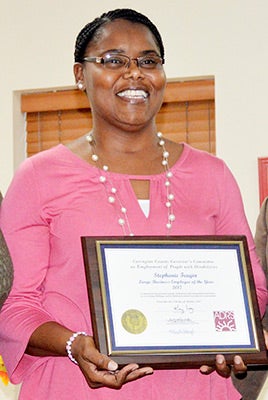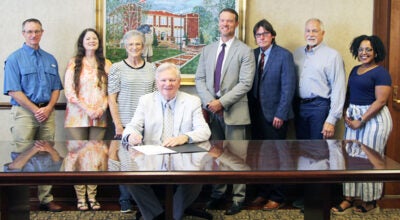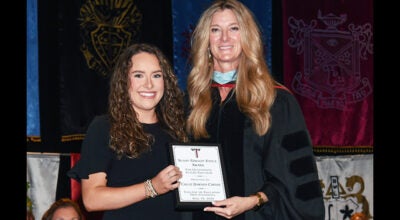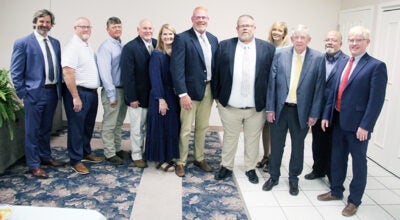Health issues didn’t stop Feagin
Published 1:34 am Tuesday, October 17, 2017

- Stephanie Feagin found it difficult to get a job while dependent upon dialysis. But as a kidney transplant recipient and recent community college graduate, she was named employee of the year.
At 32, Stephanie Feagin lived a normal life, with a wonderful family of four daughters, and a supportive husband. And then a regular annual doctor’s visit turned sour.
Feagin’s first indicator of renal failure was her blood pressure: 238 over 40.
She was immediately hospitalized at Andalusia Health, and the nurses told Feagin’s husband that she was a “walking time bomb”.
Her kidneys were spilling proteins.
Feagin, who’d experienced dialysis first hand from family members, knew exactly what she wanted to do.
She made an appointment with Dr. Krothapalli, a nephropologist out of Montgomery.
The plan was to prepare her for haemodialysis.
“I really wanted a second opinion,” Feagin said, “I wanted to know my options.” So Feagin visited a doctor out of Crestview, and received the worst news. She was in stage four out of five for kidney failure.
When she returned to Dr. Krothapalli, her numbers looked better than before.
“He said I might never even have to have dialysis.” Feagin said.
That was in 2015. For the next two years, Feagin worked on adapting to her illness. She exercised, ate clean, lost weight, and even got a new job.
When Feagin thought everything was working in her favor, it all changed.
In 2007, she got her labs done locally one day, only to get a personal call from Dr. Krothapalli himself, telling her to be in his office the next day.
She started dialysis the next day, and for the next seven years, went to Montgomery three times a week, and took four-hour treatments each time. Her husband drove her every day after work.
Dr. Krothapalli put Feagin on a kidney transplant list in 2008.
With her life revolving around her treatments, it was hard to work. She tried working during the day, and taking treatments at night. However, Feagin’s employer terminated her in the summer of 2008. Feagin struggled to find a job that was full-time and included the benefits that her illness needed.
She was on disability to make ends meet.
Two companies offered her work, but when she mentioned she was on dialysis, they claimed they found someone, “more qualified.”
“There’s a lot to dialysis that people don’t understand,” Feagin said, “People always think that because you’re on it, you’re going to die. That’s not it at all.”
In July of 2010, Feagin got a part-time job that worked around her schedule easily. For four more years, she worked, took care of her four children, and was an active member of her husband’s church.
In 2014, Feagin enrolled in Enterprise Community College to work toward an associate’s degree in office administration.
In the mean time, she was a back-up candidate for three kidney transplants.
“I was so mentally and physically down,” Feagin recalls, “I found myself having negative thoughts about others who received transplants when I didn’t.”
Feagin turned to God in her times of need, with her husband as her support system.
“I remember my husband saying, ‘You can either give up, or get up and live.’,” Feagin says. “At the time, it’s what I needed to hear.”
Feagin received a call from the hospital in November of 2014, and thought nothing of it. She was in Wal-mart buying groceries, when they told her they have a possible kidney for her. They told her not to eat the night before, and arrive the next morning in Montgomery. Feagin brushed it off, but continued to pray about it. She was used to it being on standby by then, and didn’t want to get her hopes up.
Little did she know, that kidney was her new kidney, and she was on a miraculous road to recovery.
However, the transplant wasn’t the easiest. So that her body wouldn’t reject her new kidney, she had to have an incredibly weak immune system. She took 20 pills a day.
After all of this, Feagin was still on the hunt for a full time job. In August of 2015, Feagin got an interview at the Montezuma Center. She told the managers interviewing her she was on dialysis, and she waited for them to turn her away.
“I remember the manager saying, ‘When can you start? As long as you’re in good health.’” Feagin said. It was like a breath of fresh air for Feagin, and she knew then that this was the job she wanted.
She started out in developmental disabilities department.
She assisted with plenty of people with mental and physical illnesses that stopped them from living a normal, day-to-day life.
In 2016, Feagin was hospitalized because doctors feared her body was rejecting the kidney. Her supervisors at the Montezuma Center called every day to check on her. When she was back on her feet again, she resumed work full-time, and on the weekends she worked at her part time job.
In 2017, she earned her associates degree in office administration with honors.
Feagin went through seven years of dialysis, six years on a wait list for a kidney that she had to have survive, struggled to find employment to help support her family, and raised her four daughters- all while battling with a part of her she couldn’t help.
“My advice to dialysis patients is: believe. Have your faith, friends and family. Eat right, and listen to your doctor. Don’t give up on your mental battle. It’s important to stay positive.”
Last week, Feagin was recognized as employee of the year at the Covington County Committee on Employment of People with Disabilities luncheon.





